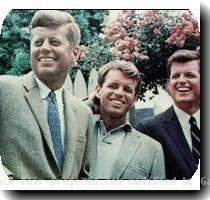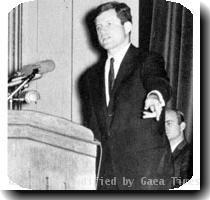Political insider, Cosmo centerfold lead in Mass. race for Kennedy’s Senate seat
By APThursday, December 3, 2009
Insider, centerfold lead in race for Kennedy seat
BOSTON — The race for a Senate seat once held by John Quincy Adams, Daniel Webster, John F. Kennedy and “liberal lion” Edward M. Kennedy is shaping up as a battle of relative national unknowns, led by a state Democratic insider and a Republican lawmaker perhaps best known as a male centerfold and father of an “American Idol” contestant.
It should be a monumental race, given that the winner will replace a man President Barack Obama eulogized as “the greatest legislator of our time.” But the campaign, whose top contenders will be decided in Tuesday’s special primary election, has been curiously low on wattage.
“I won’t say I’m surprised, but I’m disappointed,” said Marc Landy, a political science professor at Boston College. “Part of it comes from having an election at this awkward time. Election Day has its own dignity; it’s an occasion. Right now, it’s off season. That takes away a lot of the luster.”
Attorney General Martha Coakley leads the field among Teddy Kennedy’s fellow Democrats. The 56-year-old has targeted women and abortion rights supporters even while asking the broader electorate to make a gender-blind evaluation of her resume. It includes stints as a federal prosecutor, district attorney and, since 2007, the state’s top law enforcement officer.
The daughter of an insurance salesman and homemaker, Coakley nonetheless exudes a patrician bearing, speaking through a jutted jaw and appearing unflappable in four televised debates.
The likely Republican nominee, state Sen. Scott Brown, is an attorney, lieutenant colonel in the Army National Guard and triathlete whose personal life has proved ripe for tabloid fodder.
Brown’s wife is a Boston TV reporter who once appeared in a bikini in a music video. His elder daughter, Ayla, was a semifinalist in the 2006 “Idol” televised talent show. And Brown, 50, helped pay his law school bills by posing naked — albeit with a strategically draped hand — in the June 1982 edition of Cosmopolitan.
The general election between the two party nominees will be Jan. 19. The seat has been held on an interim basis by Paul G. Kirk Jr., the former Democratic National Committee chairman.
Coakley has offered up a law-and-order platform, suggesting she will crack down on Wall Street for the nation’s economic crisis. Yet she also opposes Obama’s call for more troops in Afghanistan.
Brown favors that strategy and has criticized Coakley both for opposing it and suggesting she would support a war tax to pay for the 30,000 additional troops.
When Kennedy died in August at age 77 of brain cancer, local politicos projected a battle royale to succeed him. But one by one, the most likely inheritors of the Camelot legacy stepped aside.
Kennedy’s widow, Vicki, proclaimed, “There’s only one Sen. Kennedy,” and former Rep. Joseph P. Kennedy II — the son of the late Robert F. Kennedy — said the best way for him to contribute was to remain atop his nonprofit energy company.
Incumbent politicians such as Rep. Barney Frank cited their congressional seniority, while others complained about incessant travel between Boston and Washington.
Kennedy had no such concerns as he served in the Senate for nearly 47 years and became its second-most senior member.
On the Democratic side, Coakley is trailed in polls by Rep. Michael Capuano, nonprofit co-founder Alan Khazei and Boston Celtics co-owner Stephen Pagliuca.
Capuano, a six-term congressman, has taken the unusual tack of campaigning as a Washington insider. He is employing a thread-the-needle strategy of targeting the relatively small crowd of party loyalists expected to vote in the primary, prompting Coakley to move even further to the left.
The 57-year-old Capuano has cast himself as a political pragmatist and says he has the record to maintain Kennedy’s liberal tradition and famed constituent- and pork-delivery systems.
Khazei, 48, is the son of an Iranian-American surgeon and an Italian-American nurse. He started the youth-activism program City Year and other civic engagement programs. He and Pagliuca have refused to accept political action committee and lobbyist donations, and Khazei argues he can change the political system by invigorating the public.
Pagliuca, 54, made a fortune estimated at $400 million by working at the same private equity and venture capital firms that enriched 2008 Republican presidential candidate Mitt Romney. While having donated to Romney during his 1994 race against Kennedy, and Republican George W. Bush during his 2000 campaign again Democrat Al Gore, Pagliuca calls himself a progressive Democrat and says he will bring a businessman’s perspective to Capitol Hill.
On the Republican side, Brown is leading businessman and attorney Jack E. Robinson.
Robinson, 49, has become a perennial candidate after unsuccessful Senate, House and secretary of state campaigns. His 2000 campaign nose-dived after he issued a pre-emptive report listing a series of legal problems. One chapter was headlined, “Restraining Order.”
Landy thinks the GOP nominee could inject some vigor into the general election race, as Brown was already doing Thursday when he criticized Coakley for saying she was open to a war tax to pay for a troop increase in Afghanistan.
“When the Bush administration was in and the (Iraq) war dominated, it was hard for a Republican to say anything that voters here wanted to hear,” Landy said. “This administration has taken positions that are very unpopular. That means Scott Brown will have the ear of the voters.”
A Boston Globe survey last month found Coakley leading Capuano 43 percent to 22 percent among likely voters, but both campaigns’ internal polls have shown tightening in recent days.
But the Globe also found 26 percent of respondents saying they had definitely settled on a candidate. Another 24 percent said they were leaning toward one, while 50 percent described themselves as uncertain.
A Suffolk University poll last month found Brown leading Robinson 45 percent to 7 percent, with 47 percent undecided.
Tags: Barack Obama, Boston, Edward Kennedy, Events, General Elections, Massachusetts, North America, Primary Elections, United States





